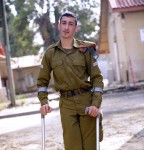Cpl. Ben Levi is a participant in the Great in Uniform program. (photo from Israel Defence Forces)
The program Great in Uniform aims to integrate young Israelis with special needs into the Israel Defence Forces. To date, some 200 youths have been successfully integrated through the program into administrative and logistical positions in the IDF’s air force and home-front command.
The program was founded by Lt. Col. (Res.) Ariel Almog, who became disabled while serving in the IDF when responding to a terror attack. Eventually, he began looking for a way he could return to the army. He then realized that he would like to help make this a reality for others with disabilities, too.
Typically, Israeli teens with special needs are granted an exemption from obligatory military service. By opening a window and creating a support system for those wanting to volunteer to join the army, the IDF is making it possible for these young Israelis to be integrated into the army with their peers. The teens begin as volunteers, serving in various roles. In some cases, they can get advanced training and even become officers.
This has been the case with Ben Levi. Levi was diagnosed with cerebral palsy (CP) when he was born. He has learned to live with his disability and the 21-year-old longed to join the army and follow in the path that many in his family have taken: he wanted to serve in a fighting unit.
Levi said he currently works “in the storage room, which is part of the logistics force in the home command. When I have trouble, people help me, but I don’t feel I’m a volunteer. I feel I am a solider for all intents and purposes. I try to do what I can. I am disabled and it’s not obvious at all that I would have gotten as far in the army as I have.
“I can tell you a secret,” he added. “I’m actually interested in going for the officer’s course.
“I’m really happy I got to draft and that I get to serve the country,” he said.
Levi said he feels like a soldier just like any other, and has many friends on the base. When he runs into difficulty, he knows he has his family’s support. In fact, Levi’s family has gotten involved in the IDF program.
“It’s fantastic to wake up every morning and know that I am serving my country, have a job and a way to contribute – it proves to me that CP can’t limit me,” said Levi. “You come into the army as a child and you come out as a full grown person.”
Levi’s commander, Ariana Goldsmith, 18, is originally from Long Island, N.Y. She has been living in Ra’anana for the past seven years after making aliyah with her family.
Goldsmith’s becoming a commander of special soldiers was her own “dream come true,” she said.
“I’ve been volunteering for many years with people with special needs [with] Yachad. My cousin is special needs, I grew up with him, and I’ve been volunteering since I was younger for different organizations.”
Although Goldsmith only joined the IDF four months ago, she was given the title of commander to allow her to do her job – escorting special needs soldiers on base.
“Since I heard about this program, this job has been my dream,” said Goldsmith. “There’s no other job I want to do. So, I ended up getting in contact with the head of the program … it took a long time, about a year and a half, and a lot of working it out with the army, but it ended up working out.
“This is an unbelievable program – to see these kids … they just want to do it so bad. There are so many soldiers in the army who aren’t that into [serving]. You know, everyone has to [serve].” Those with disabilities, however, “don’t have to do the army,” she continued. “They want to, to give back, and they are unbelievable.”
Goldsmith is the only escort in the program at the moment, but that is not stopping her from blazing a trail for future escorts. “With my experience, I can give back to the program and make it more of an official job … so that, after me, more people can go into the army and become a commander for this program.”
Goldsmith feels most units in the army would benefit tremendously from incorporating special needs soldiers, and that the benefits of the program are greater for able-bodied soldiers than they are for special needs soldiers. “I think the base and soldiers get so much out of seeing these [special needs] soldiers being volunteers, and that all they want to do is work. They gain so much from seeing them, they learn a life lesson. Some of these soldiers have never seen special needs people before…. By seeing them and working with them, they gain so much patience and they make connections with them…. This really raises the morale on base in general.”
Rebeca Kuropatwa is a Winnipeg freelance writer.

